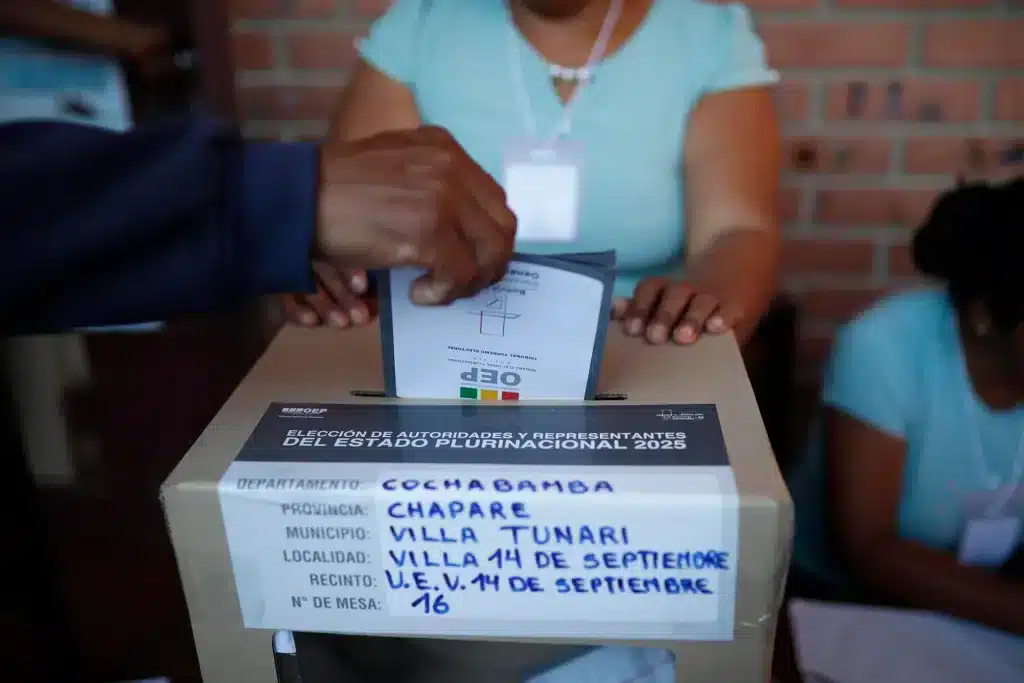
A man casts his vote this Sunday, August 17, at the School in Villa 14 de Septiembre, Villa Tunari municipality, Bolivia. Photo: Rodrigo Sura/EFE.

Orinoco Tribune – News and opinion pieces about Venezuela and beyond
From Venezuela and made by Venezuelan Chavistas

A man casts his vote this Sunday, August 17, at the School in Villa 14 de Septiembre, Villa Tunari municipality, Bolivia. Photo: Rodrigo Sura/EFE.
Following an election day described by Bolivian authorities as peaceful, with no major incidents and broad citizen participation across the country, polling stations closed at 4 p.m. local time, Sunday, August 17, under the established schedule for the general elections.
Polling stations across Bolivia opened early under strict security protocols with electoral juries, notaries, political delegates, and observers from 19 international organizations present. The Supreme Electoral Tribunal (TSE) reported 100% of voting tables opened except one table set up abroad.
Eight candidates were competing for the presidency: two left-wing (Andrónico Rodríguez and Eduardo del Castillo) and six right-wing/center-right opposition candidates (Samuel Doria Medina, former president Jorge “Tuto” Quiroga, former military officer Manfred Reyes Villa, Rodrigo Paz Pereira, Jhonny Fernández, and Pavel Aracena Vargas).
El presidente de #Bolivia🇧🇴, Luis Arce, enfatizó la importancia de las elecciones generales que tienen para preservar la democracia y convocó a la ciudadanía a acudir a las urnas y cumplir el deber cívico de votar para elegir a las futuras autoridadeshttps://t.co/4OC6845oex
— teleSUR TV (@teleSURtv) August 17, 2025
These are Bolivia’s most closely observed elections, with over 3,500 observers from 19 national and international organizations.
To win outright and avoid a runoff, candidates need an absolute majority or 40% of votes with a 10-point lead over the runner-up. Otherwise, a second round will be held between the top two candidates.
Bolivians voted for president and vice president; 36 senators; 130 deputies; seven indigenous peasant deputies; and nine representatives to supranational bodies (one per department).
Voting abroad
TSE President Óscar Hassenteufel reported voting abroad proceeded normally, with 100% of polling stations open except one scheduled in the US.
Bolivians in Japan, Italy, Colombia, Brazil, Argentina, and other countries voted on this decisive day, demonstrating residents abroad maintain significant political influence.
Bolivia Ready to Hold Presidential and Parliamentary Elections on August 17
Incidents reported
Despite the calm atmosphere, a violent incident occurred in Cochabamba where Popular Alliance presidential candidate Andrónico Rodríguez was attacked with stones and heckled by a group.
Rodríguez voted after noon at the José Carrasco Educational Unit after earlier incidents prevented morning voting. As he left, people threw rocks, creating tension that required enhanced security.
The attackers’ violence left the candidate’s campaign manager hospitalized. An explosion was reported outside the Entre Ríos polling station shortly before Rodríguez arrived to vote.
(Telesur)
Translation: Orinoco Tribune
OT/JRE/SA